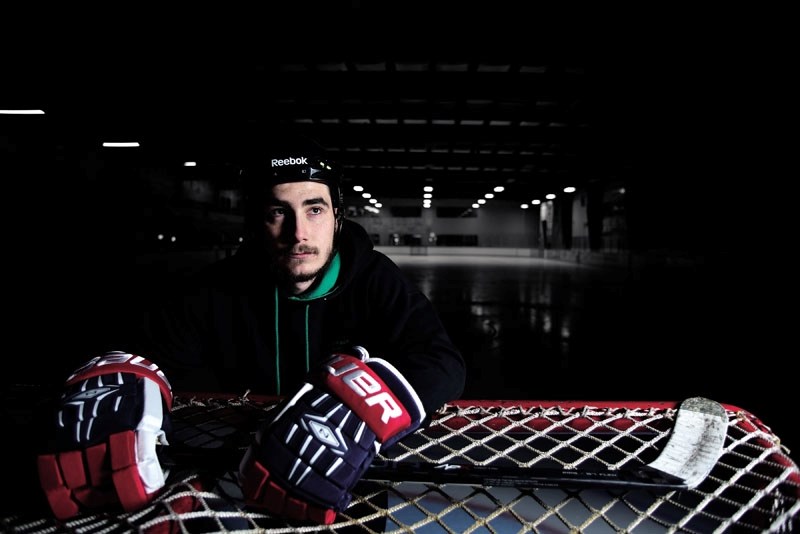Sam Yetman looks like every other 20-something in Cochrane, smile on his face, a few jokes in the dressing room with his friends, but there's a darker side to his persona.
Sam Yetman looks like every other 20-something in Cochrane, smile on his face, a few jokes in the dressing room with his friends, but there's a darker side to his persona.
Moods change, depression sets in and even he has a hard time recognizing himself.
Yetman is concussed.
It was said best by Hall of Fame running back Eric Dickerson: “You are supposed to be tough. You are supposed to play through pain. You are not supposed to cry. We are taught that early on in the game as kids. Tough sport. Brutal sport. ”
Dickerson filed a lawsuit against the National Football League for its lack of concussion protocol and lack of public release about the dangers/life altering effects of concussions in sport.
Yetman has felt the effects of a contact sport, one that's only been made faster, bigger and produced more talk of concussions in recent history, due to new clutch and grab rules throughout hockey as well as a quicker product on the ice.
At times he has even felt the politics and pressure to play regardless of health, he said.
“I can't specifically remember when my first concussion was; it must have been when I was 13 or 14 and to be completely honest there has been so many along the way I don't know the exact number of concussions I've had, ” Yetman said.
While he can't remember the number of concussions, he vividly recalls the last.
Sept. 13, 2012, against the Calgary Mustangs. That was the last time an 18-year-old Yetman stepped onto the ice with a clear head.
“My last concussion was September, I was playing junior A hockey for the Olds Grizzlys in the AJHL (Alberta Junior Hockey League). I went to hit an opposing player and he butt ended me with his stick in the jaw, ” he said.
“I knew about a minute later I had a concussion. ”
So with that single play on a fall night in Olds, Yetman stepped off the ice a much different person, someone looking for help, but only found a team, he said, which was willing to bend the rules to avoid keeping him out of the lineup.
Yetman asserts that despite his symptoms continuing and getting worse, despite his knowledge of what a concussion is and how it feels, the Olds Grizzlys refused to list his injury properly and instead listed him as day-to-day with an upper body injury, he said.
“They did not go through the proper concussion protocol. They also did not wait the two weeks symptom free rule to ask me if I was Ok to play again. I felt pressured to return early, I felt very compelled to stay and keep playing, ” Yetman said.
In hockey, as in other competitive sport, the predominant mentality is “win and you're in, ” he said. For Yetman the stakes were high. The thought of being seen as soft, or unreliable, was too much. He was under the belief that if he stayed out of the lineup it would likely be the end of his hockey career.
“I kept playing because once you are out of the lineup for too long it's hard to get back in. When my trainer approached me and asked me if I was OK to play, I knew I wasn't ready, but I played anyway. I knew the coach wanted to play me that game and I didn't want to take the chance of upsetting him and being put in the stands permanently. ”
The fact remains that despite giving the Olds Grizzlys a chance to list his injury correctly, stating that he did tell the team he was concussed, the team instead listed his injury as “upper body, ” not concussion.
The Alberta Junior Hockey League (the same league that has produced NHL stars such as Dany Heatley), the league in which Yetman played his last game of competitive hockey, has a strict concussion protocol. All cases of head trauma resulting in a concussion must be listed as such and must have a doctor's approval to return to action with a minimum of two weeks symptom free, he said.
Hockey is a highly-competitive sport, it is unforgiving and at the highest levels it can be downright dog-eat-dog, with players taking pressure from coaches, parents, fans, and teammates to perform and play at a high level, and to never admit to not being tough enough.
Many of the players in the AJHL are fighting for a shot at the Canadian Hockey League (Calgary Hitmen, Edmonton Oil Kings, etc.), and the chance to win scholarships to some of the top universities in Canada and the USA.
“One minute I was thinking I had this future, this chance to do something, and the next I was thinking I'm screwed, I can't do anything else the way I could play hockey. It is the most depressing feeling, ” said Yetman.
But looking back, Yetman said those golden carrots were not worth the loss of quality of life.
“I really want to stress to the young kids that hockey is only a small part of your life; you don't want it to define you. You are not a hockey player, you are a human being that is capable of many exciting things and hockey is one of them. Find other loves, so that when hockey is over you have other things to fall on too. ”
Realizing I couldn't play anymore was almost as bad as the concussion itself. You see so many kids growing up playing hockey like it's a religion, but when it's stripped from them they don't know what to do. That's what happened to me, ” he said.
This story continues next week.
